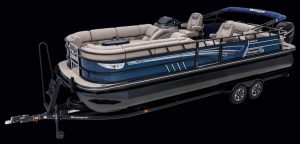Have you ever been watching a horror movie and everything gets really quiet all of a sudden? Something like:
“Angela slowly walked down the hallway on the second floor of the old Victorian farmhouse. The candle in hand was flickering, teasing to go out as the wood creaked and hawed under her stocking feet. The thunder and lightning outside signaled ill intent. A wolf howled outside and just then the candle blew out. Darkness…”
Its that kind of moment when your heart skips a beat. Utter and sudden spooky darkness. Now imagine you’re out on your boat at night. Eery darkness. And without lights, you can’t see a darn thing except for any lights that might be on the horizon… or maybe twenty feet in front of the boat?
Let’s make sure we’re prepared before heading out on the water. That’s what I think is a good recipe for survival. I mean, I could drown. I don’t have gills and therefore want to be prepared for any situation, including being stuck out on the water in the dark.
What To Expect When Boating At Night
We’ll take a look at a few good techniques that could be a real stress relief. It’s amazing what a little preparation can do. So, let’s prepare by jumping right in and taking a look at what we’re dealing with here.
The first thing you need to consider when going out on the water is whether or not there could be the possibility of being stuck, stranded or lost where you plan ongoing. Obviously we want to prepare for any eventuality but for the sake of time, let’s focus on going out on the water with a smaller vessel as larger vessels will be better equipped for dealing with dusk and night boating. It is VERY different from the day, let me tell you. Especially in rough water.
Preparation For Night Boating
This is the number one most important thing you can do. Prepare. That starts first by trying to imagine, through understanding, what it would be like. Let’s say, for example, that you’re heading out fishing with a buddy and you have an 18’ little bass boat rented. It is older and the guy you are renting from assures you it works just fine. He gives you a piece of paper and a small pail and tells you to have fun and be back by 5 pm to return the boat.
You go out to the dock with the teenager working at the boat rental place and he shows you how to start and operate the boat. He shows you the gas can, seats, points out the portable toilets on the shore and walks away. You go out with your buddy and lose track of time fishing because you’re catching bass like no tomorrow. After a big fish is reeled in you notice that the sun is pretty low in the sky, but it took you a long while to get to this fishing spot you discovered.
You decide you’d better head back, as some clouds, and darkness roll in over the lake. Your buddy has one of those lantern style flashlights and lights it up. Your eyes adjust but now you can’t see more than a few feet off the boat’s edge. Literally.

Rules of the road… er, water?
This little tale is meant to bring you to a place where you start to feel what it might be like. You’re not helpless out there on the water, but it can be very spooky, and incredibly dangerous if you don’t follow some basic rules. Here are six rules I like to follow for night boating.
Turn off or dim as many lights as possible.
You want to keep a signal light on, but it should be placed behind you. Never have a boat signal light in front of you. You need your eyes to adjust to the dark so you can see better. A bright signal light in front of you blinds you to anything in front of the boat. And seeing where you’re going is probably a good idea.
Bring supplies even if you don’t think you’ll need them.
Things like an extra few granola bars and most importantly a good flashlight or two. You can use a flashlight to communicate with any other possible boaters in the area or in the distance. A flashlight can act as a sort of headlight in small boats.
Don’t forget a towel.
Okay, this isn’t a Vogon space cruiser. But, a towel can come in handy. If you’re in a boat and there is a bright instrument cluster that you can’t turn the lighting down on, you can drape a towel over it to block the light. This will help you see. Or, if you are in a smaller craft, it can get awfully cold out on the water, especially at night. A towel can be draped over your shoulders to help keep you warm. It can also be used to dry you off, should you get wet. What a concept!
Slow the boat way down.
This might not seem like a big deal, but one of the things about boating at night is that it is wicked hard to judge distances. You can look out across the water and think the lights you see are just a few hundred meters when in truth they could be several kilometers away. Remember, there are no trees and hills and buildings and things to block your view. So, unless there were giant waves or mist, you can see for a very far distance across the surface of the water when you’re in a boat. And there’s nothing to stop the light from way across the water from reaching you. Don’t be deceived. You could be boating towards what you think is really far away and smash your boat into the dock that you didn’t see because there weren’t any lights on it.
Watch where you look.
There are two things you don’t want to do at night out on the water in a boat. One is to look up at the sky for long while moving. Doing this in a boat while moving can lead to dizziness, even for an experienced boater. And of course, that could bring seasickness with it and nobody likes that.
Steer very clear of other boats, especially those with a lot of lights.
Experienced night boaters know to turn down as many lights as possible. Sure, you still have to have a signal light on your boat if you intend to be out at night, but no one wants to drive blind. That’s why experienced boaters just have a single signal light and place it to their rear so it doesn’t blind their vision. But, I’ll talk more about lights in a second.
Boat Light Rules
There are different rules and/or laws that are meant to be followed when it comes to having lights on a boat for the night. The size of the boat and how the boat is propelled have a lot to do with it. In general, the idea is that for a canoe or kayak, you need to have a flashlight. Preferably you want a good waterproof one. I found and trust the one I recommend at the end of this article in case you need a decent waterproof flashlight. They come in handy and a good quality one is important when it comes to your personal safety. Remember, this is for emergency use. It’s got to work.
There are different laws depending on where you live regarding whether or not you are even allowed out on the water in a personal watercraft after dark. So, make sure you check what your local laws are first!
The next size up in terms of boats after the personal watercraft is your small, powered boats. These can be fishing boats, or pleasure boats, sailing boats, pontoon boats, et cetera.
Canadian Night Boating Laws
In Canada, the law states that for these boats they should have a red and green light on the front, one per side to denote which side is the port (red) or starboard (green). This can help other boaters know what direction your boat is facing.
Boats also have to have a white light that shines in all directions. In the smaller boats, this light is usually situated at the back of the boat. This is so the driver is not blinded by the light, as it would be behind them. Boating at night can be safe if you know what you’re doing and you’re prepared.
Boats that are at rest, such as those which are anchored, must have a single white light which can be seen from all directions. This should be located above the vessel. For example, on a sailboat, it would be at the top of the mast. On a fishing boat, it should be on a small pole that can be extended upward so the light is raised. This ensures the light can be seen by any other boats and collisions in the dark can be avoided.
United States Night Boating Laws
Most states in the US have some fairly clearly defined laws about whether or not you are allowed to be out on the water at night. For example, most states have a law that stipulates that you cannot be out on the water on a personal watercraft after dark. This is worded in different ways, depending on the state. But the consensus is that you are not allowed to operate a personal watercraft in a reduced visibility situation. Nighttime is classified as reduced visibility. And yes, a jet ski is indeed considered a personal watercraft, so no jet skiing after dark! Okay, you little water gremlin?
Seriously though, those are the rules in many states. Be sure you check before you get yourself in hot water. No pun intended.
Smart Tip For Night Boating
Post a lookout. This should obviously be someone who isn’t driving. There should be clear communication between the lookout and the driver of the boat. Why a lookout? Ever watched a pirates movie?
“Captain! Land Ahoy!”
The Crow’s Nest Boy
Boats are just better with a lookout. That dark water can be wicked hard to see anything. And if you happen to be in a lake that’s shallow, it’s all the more important to go slow and have someone help keep an eye out.
“Keep a weathered eye on the horizon.”
Jack Sparrow
Conclusion
Don’t go out boating at night unless you are confident in your boating ability and the following criteria are all met.
- It is legal where you intend to go boating, to do so at night with the watercraft or vessel you want to do so with. Make sure you’ve done your local research by contacting your local water police or harbor patrol or whatever name the locals have given to those who patrol the local waterways.
- You have experience boating at night already.
- You have adequate safety gear as well as electronic gear to be able to navigate safely.

Aluminum vs. Fiberglass Bass Boats
Can You Wakeboard Behind A Bass Boat?
PowerSeeker Intelligent Fish Finder – A Smart Fishing Gadget
PowerSeeker Intelligent Fish Finder Review Do you love fishing? Who doesn’t? Fishing is not an…
How Much Does A Catamaran Cost? (Big Crazy $$$?)
You’ll want to know the Catamaran cost if you find sailing on lakes and fishing…
Boat Propeller Anti-Fouling Paint, Grease, And Awesome Tips
Boat Propeller Anti-Fouling Paint questions? You’re in the right place. Boat propellers often develop subaquatic…
A Guide To The Materials J-B Weld Works On (With Some Awesome Tips To Help)
If you’re looking for the materials J-B Weld works on, you’re in the right place….
More Articles From Boating Guide
- Boat Hull Types – Which Boat Hull Is Best?
- The Complete Runabout Boat & Trailer Towing Guide
- Rope Types Every Boater Should Know
- Boating Safety – Life Vest And Life Jacket Types
- Before You Buy Guide: Understanding Fish Finders And GPS
- A Complete Catamaran Guide
- Boating Gear Requirements For Canada And USA Waters
- Pontoon Boat Basics
- Can A Catamaran Capsize?
- Are Bass Boats Good For Shallow Water?
- A Guide To Lake Fishing On A Boat
- Staying Safe On A Catamaran: 24 Essential Tips
- Specialty Clothing For Different Water Sports
Return To Home * About The Author




















